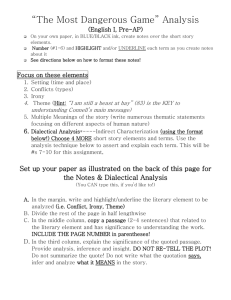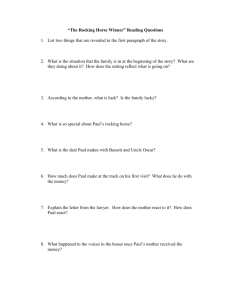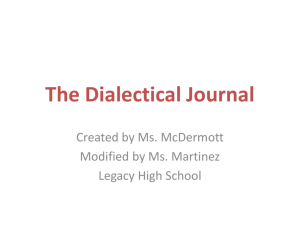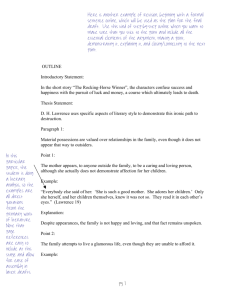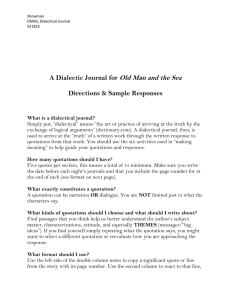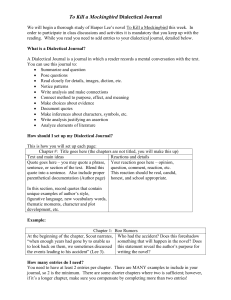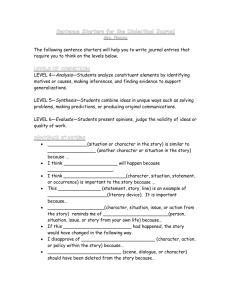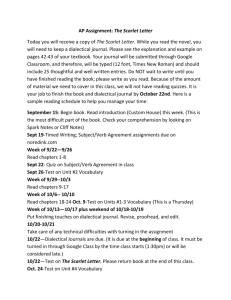Guidelines for the Dialectical Journal
advertisement
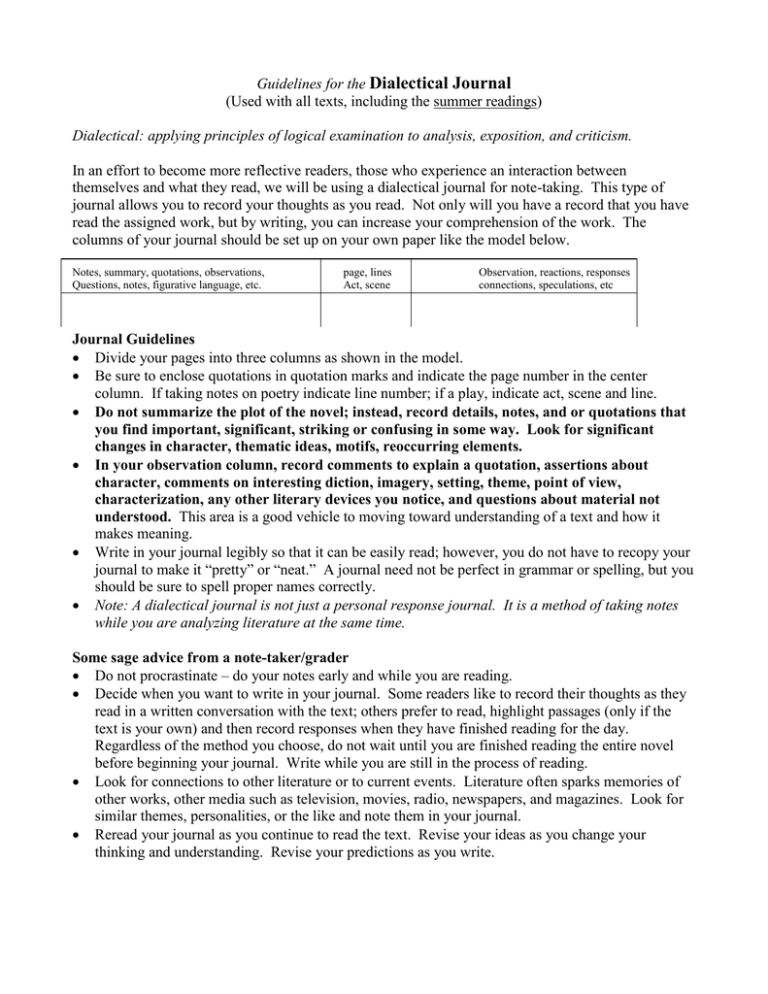
Guidelines for the Dialectical Journal (Used with all texts, including the summer readings) Dialectical: applying principles of logical examination to analysis, exposition, and criticism. In an effort to become more reflective readers, those who experience an interaction between themselves and what they read, we will be using a dialectical journal for note-taking. This type of journal allows you to record your thoughts as you read. Not only will you have a record that you have read the assigned work, but by writing, you can increase your comprehension of the work. The columns of your journal should be set up on your own paper like the model below. Notes, summary, quotations, observations, Questions, notes, figurative language, etc. page, lines Act, scene Observation, reactions, responses connections, speculations, etc Journal Guidelines Divide your pages into three columns as shown in the model. Be sure to enclose quotations in quotation marks and indicate the page number in the center column. If taking notes on poetry indicate line number; if a play, indicate act, scene and line. Do not summarize the plot of the novel; instead, record details, notes, and or quotations that you find important, significant, striking or confusing in some way. Look for significant changes in character, thematic ideas, motifs, reoccurring elements. In your observation column, record comments to explain a quotation, assertions about character, comments on interesting diction, imagery, setting, theme, point of view, characterization, any other literary devices you notice, and questions about material not understood. This area is a good vehicle to moving toward understanding of a text and how it makes meaning. Write in your journal legibly so that it can be easily read; however, you do not have to recopy your journal to make it “pretty” or “neat.” A journal need not be perfect in grammar or spelling, but you should be sure to spell proper names correctly. Note: A dialectical journal is not just a personal response journal. It is a method of taking notes while you are analyzing literature at the same time. Some sage advice from a note-taker/grader Do not procrastinate – do your notes early and while you are reading. Decide when you want to write in your journal. Some readers like to record their thoughts as they read in a written conversation with the text; others prefer to read, highlight passages (only if the text is your own) and then record responses when they have finished reading for the day. Regardless of the method you choose, do not wait until you are finished reading the entire novel before beginning your journal. Write while you are still in the process of reading. Look for connections to other literature or to current events. Literature often sparks memories of other works, other media such as television, movies, radio, newspapers, and magazines. Look for similar themes, personalities, or the like and note them in your journal. Reread your journal as you continue to read the text. Revise your ideas as you change your thinking and understanding. Revise your predictions as you write. Sample Dialectical Notes Notes Page # “The Rocking Horse Winner” D.H. Lawrence Direct characterization of mother – Lucky because attractive and in wealthy family, married for love, bonny children – but unlucky Observations/Insights Any significance to the title so far? 302 Verbal irony – expect her to very lucky because of her good fortune. Expect her to love her children, but she doesn’t 302 More characterization, direct “There was never enough money.” 302 Setting, mood – family seems to have great self-worth; concern with material possessions and wealth Father – small income; mother – small income, but not enough for the social position they lived – hoped for good prospects 302 They lived well but felt as though they never had enough money. Recurring statement. House haunted by “unspoken phrase: There must be more money” 302 “all the more gentle and anxious for her children, as if she loved them very much. Only she herself knew that at the center of her heart was a hard little place that could not feel love, no, not for anybody.” Setting and situation– pleasant house, discreet servants, felt themselves superior to anyone in the neighborhood. Concern with money recurring – size of salaries doesn’t match size of spending. 303 “It came whispering from the springs of the stillswaying rocking horse, and even the horse, bending his wooden, champing head, heard it.” No one mentioned that there wasn’t enough money, but it haunted the house – in a whisper – even the children heard it and paused to recognize it. Foreshadowing importance of rh in regards to money and luck? 303 ‘it’s because your father has no luck.’ ‘Is luck money, mother?’ “Filthy lucre” confusion 303 Mother equates love with money – her relationship with her husband is in the dust. She had good luck before she married him, doesn’t really love him now – will son seek a way to get luck so that he can have her love? Sounds like a Freudian concept – Oedipal complex maybe. Filthy lucre – allusion, look up – New Testam.
